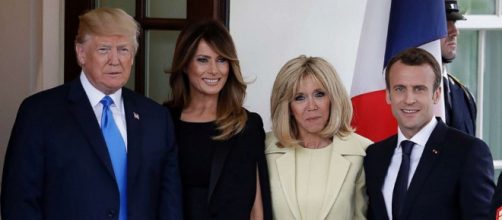DONALD TRUMP was an isolationist prior to his election as POTUS, he was critical of Barack Obama’s intervention in Syria, but then decided to bomb them a few weeks ago. However, he has always been critical of the iran nuclear deal signed in 2015, stating that it wasn’t harsh enough on Iran. After the French President Emmanuel Macron’s state visit to the US, he has stated that he believes that Trump will pull out of the deal.
The nuclear deal struck with Iran by the big six powers in 2015, means that Iran are obliged to limit their nuclear power in exchange for having the economic sanctions imposed on them since 1995 lifted.
What’s the deal with Iran?
As previously stated, Donald Trump has been long time critic of the Iran deal saying that it has been “too soft” on them but he has signed several waivers suspending the sanctions since he has taken office. More recently, he has threatened to refuse to sign the next set of waivers on 12th May if more harsher sanctions aren’t imposed on Iran. Macron stated that he is unsure whether Trump will decide but sated that in his view “that he will get rid of this deal, for domestic reasons”. Further evidence suggests that Trump is planning to scrap the deal after Congress passed four bills targeting sanctions on Iran’s ballistic missile network and Hezbollah practices.
In 1995, the administration of Bill Clinton imposed some of the toughest sanctions on Iran during the presidency of Akbar Hashemi Rafsanjani.
This prohibited US trade in their oil industry, by the end of the year, the sanctions spread over economic, trade, scientific and military sectors of the Iranian economy. The 2015 deal to suspend the sanctions called the Nuclear Non-proliferation Treaty (NPT), allows you to use nuclear technology in exchange for renouncing the development of nuclear weapons. But further sanctions have been placed on them since after they were accused of developing nuclear weapons covertly.
Iran-Israel relations prior the 90s
Israel demanded five days ago that the US impose sanctions on Iran’s missile capabilities and congress duly passed those four bills. However, Israel and Iran have been at loggerheads for a while and of course the US and UK will support their allies within the region rather than try and temper relations.
But current relations are a stark contrast to what they used to be prior the 1990s, it was a complex web of pragmatic cooperation and favourable geopolitical stances, with the US sanctions imposed in 1995 are certainly linked to the proxy war that has been ongoing underneath the surface of the other conflicts within the region between Israel and Iran, but what is the brief history of Iran-Israel relations?
Prior Iran’s 1979 revolution, Israel and Iran were united through fears of Nasserite pan-Arabism and Soviet influence in the Middle East. Israel viewed Iran as an important part of its periphery doctrine, which was meant to offset Arab states through military, intelligence, and economic cooperation with such non-Arab states as Iran.
But the then leader, the Shah, saw Israel as a pragmatic counterweight to the Arab world and he also believed the Israeli influence in Washington would benefit them as an aspiring great power. Nonetheless, the Shah was aware of the anti-Israel sentiment throughout the Middle East and kept Israel at arm’s length and not publicly embracing them.
Beyond the overthrow of the Shah, the cooperation between the two nations did not end, during the war with Iraq, the Islamic Republic favoured limited cooperation with the Jewish state and with some of the Israeli leaders hoping post-revolutionary Iran would remain part of the periphery alliance. They believed that common geopolitical interests, though increasingly more limited than previous, would facilitate a tacit cooperation.
But the revolutionary regime of Iran did not view Israel in just geopolitical terms and proxy wars through groups such as Hezbollah have been fought, but the pragmatic cooperation between them did help shape Iranian policy well into the 1990s.

